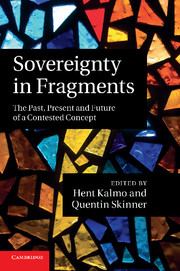Book contents
- Frontmatter
- Contents
- Notes on contributors
- Acknowledgements
- Introduction: a concept in fragments
- 1 The sovereign state: a genealogy
- 2 The apparition of sovereignty
- 3 The Westphalian myth and the idea of external sovereignty
- 4 Double binds: sovereignty and the just war tradition
- 5 The durability of organized hypocrisy
- 6 A matter of fact? The many faces of sovereignty
- 7 The survival of sovereignty
- 8 Sovereignty and after
- 9 Prolegomena to the post-sovereign Rechtsstaat
- 10 Sovereignty beyond the state
- 11 Sovereignty between government, exception and governance
- 12 Conclusion: vocabularies of sovereignty – powers of a paradox
- Bibliography
- Index
6 - A matter of fact? The many faces of sovereignty
Published online by Cambridge University Press: 04 February 2011
- Frontmatter
- Contents
- Notes on contributors
- Acknowledgements
- Introduction: a concept in fragments
- 1 The sovereign state: a genealogy
- 2 The apparition of sovereignty
- 3 The Westphalian myth and the idea of external sovereignty
- 4 Double binds: sovereignty and the just war tradition
- 5 The durability of organized hypocrisy
- 6 A matter of fact? The many faces of sovereignty
- 7 The survival of sovereignty
- 8 Sovereignty and after
- 9 Prolegomena to the post-sovereign Rechtsstaat
- 10 Sovereignty beyond the state
- 11 Sovereignty between government, exception and governance
- 12 Conclusion: vocabularies of sovereignty – powers of a paradox
- Bibliography
- Index
Summary
Sovereignty is often seen as a liminal concept. It is thought to inhabit the frontier territories between law, ethics and political science, where, as James Bryce once put it with Victorian verve, ‘the limits of conterminous sciences or branches of learning have not been exactly drawn’ and which therefore have been ‘infested by a number of vague or ambiguous terms’. The fact that the word ‘sovereignty’ has found its way into the vocabulary of various disciplines is hardly very interesting in itself. There is, however, a more fundamental sense in which the concept of sovereignty can be thought of as a liminal one. It has often been taken to stand for the rootedness of law in factual power that ultimately determines the limits of its reach. Hence the double nature of sovereignty as a quality somehow poised between facts and norms, simultaneously both political and legal. Thinking along these lines, one could say that the reason why sovereignty is a liminal concept is because it points to the paradoxical possibility that, when illegality becomes extreme, it can convert itself into a new standard of legality. One sovereignty is replaced by another so that what was before a punishable act of resistance becomes the founding act of a new state.
For a long time, lawyers, and especially international lawyers, have been interested in the question as to whether the formation of a new state is a fact or a legal fiat.
- Type
- Chapter
- Information
- Sovereignty in FragmentsThe Past, Present and Future of a Contested Concept, pp. 114 - 131Publisher: Cambridge University PressPrint publication year: 2010
- 5
- Cited by



